Abstract
Prenatal diagnostic testing raises a number of important ethical issues, some related to diagnostic testing in general and others related to the special circumstances of pregnancy. These issues are most effectively addressed in the context of a broader understanding of the goals of prenatal diagnosis. Our dual obligations--to the pregnant woman and to the fetus--have an important influence on the goals of testing. Testing seldom leads to treatment beneficial to the fetus, but more often can be beneficial to the pregnant woman, particularly if the information provided enhances her ability to make sound decisions about reproductive matters. The process of prenatal diagnostic testing can, however, limit a woman's sense of control over the decisions made about her pregnancy. It can also provide an opportunity for third parties to become involved in what are usually considered private matters. It is therefore important that the process of testing include adequate counseling and follow-up and that the patient's confidence be respected. As prenatal diagnostic technology expands, both in terms of patients to be tested and diagnoses to be sought, society will face difficult questions concerning access to testing and the justification for its use.
Full text
PDF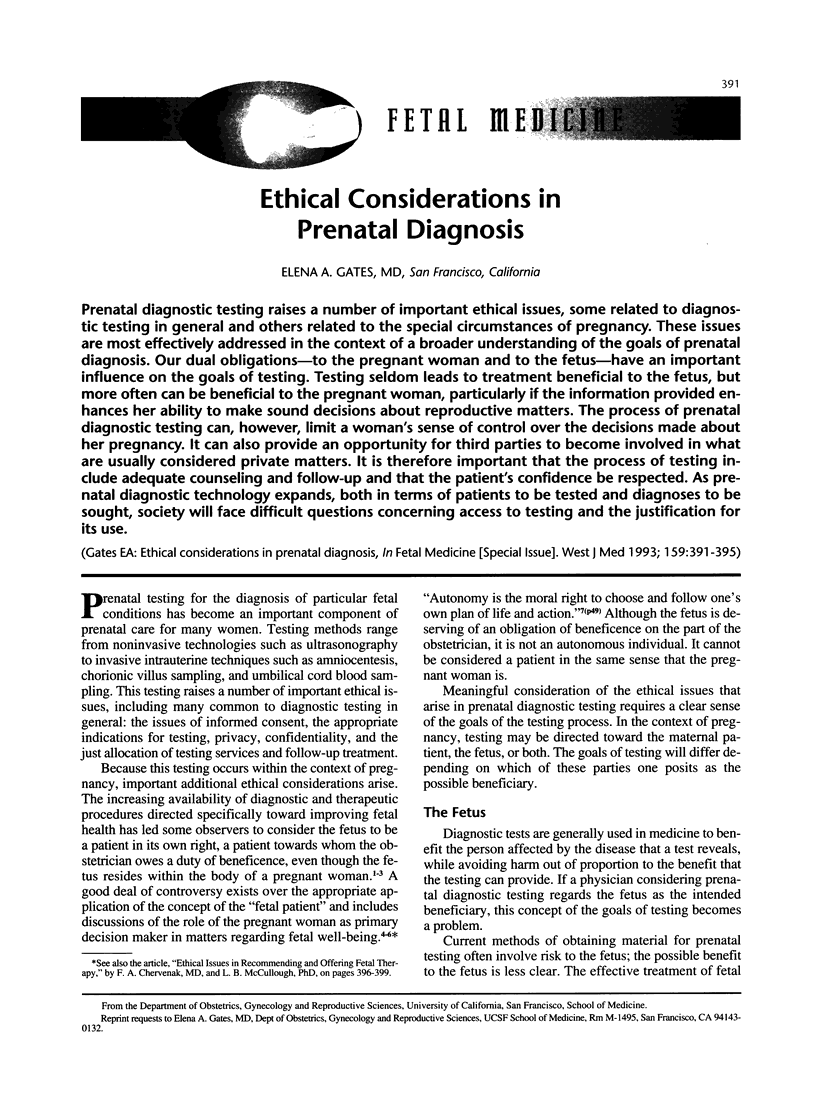
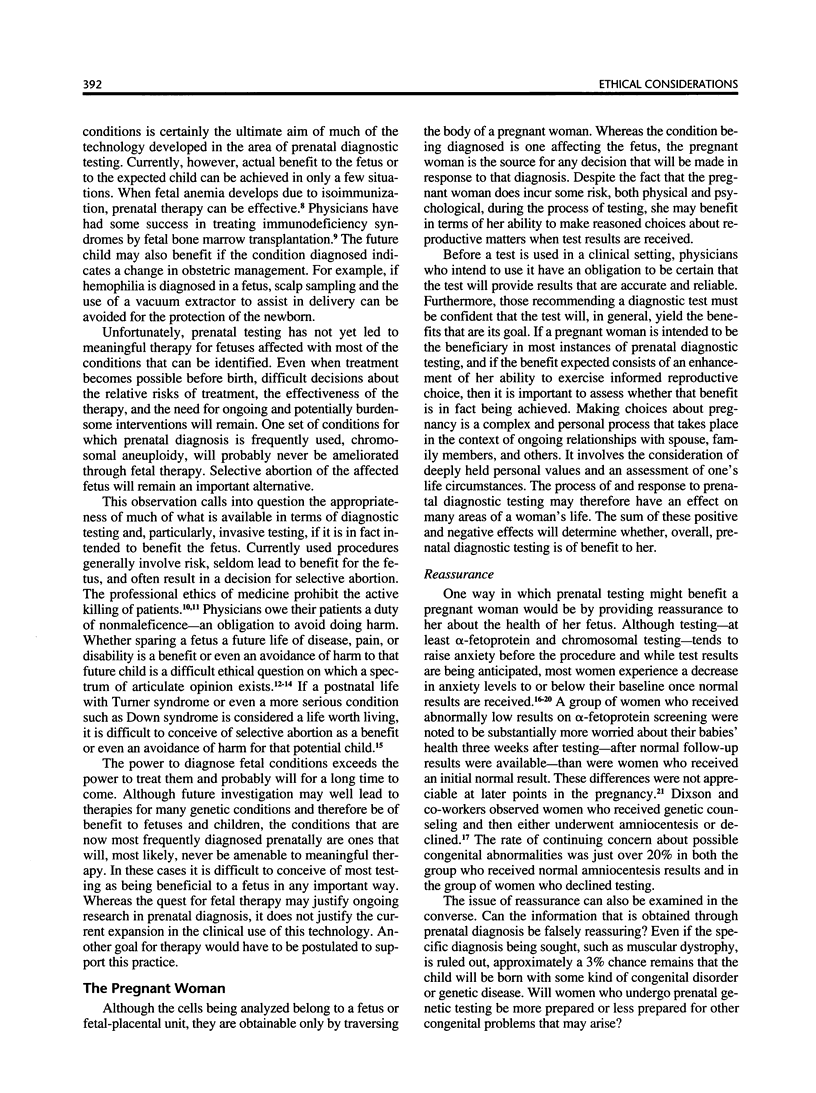
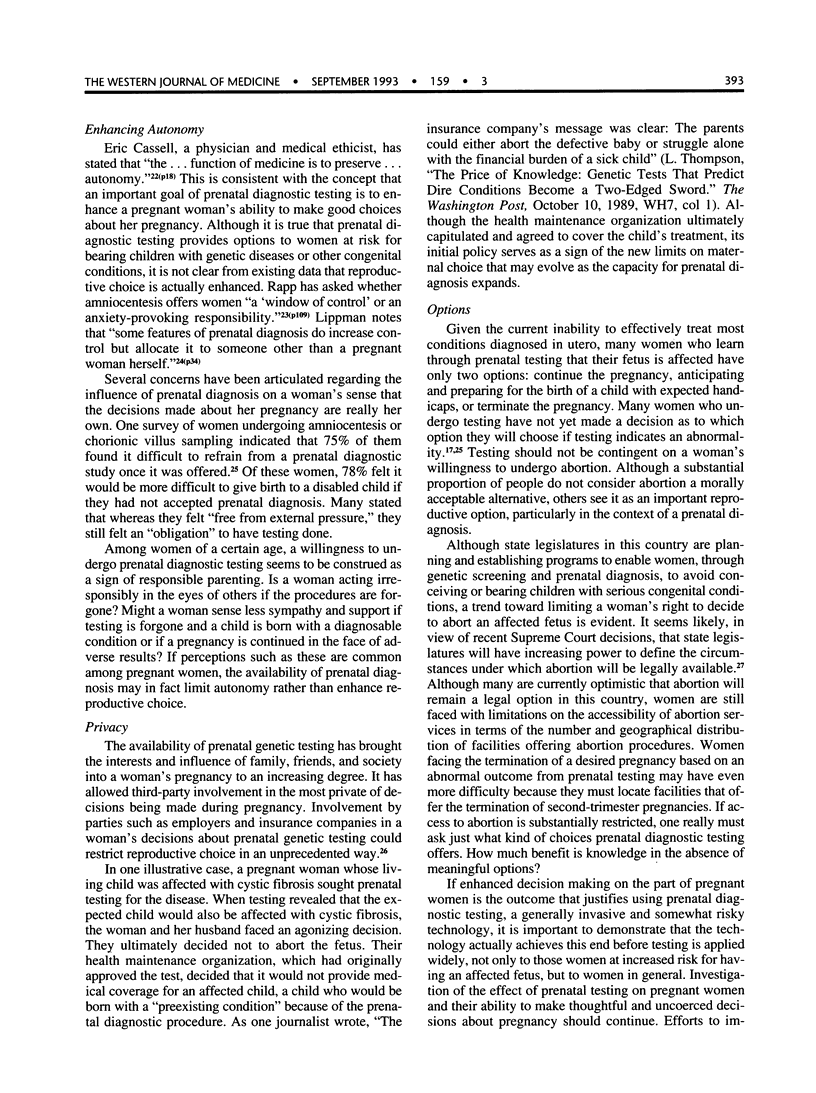
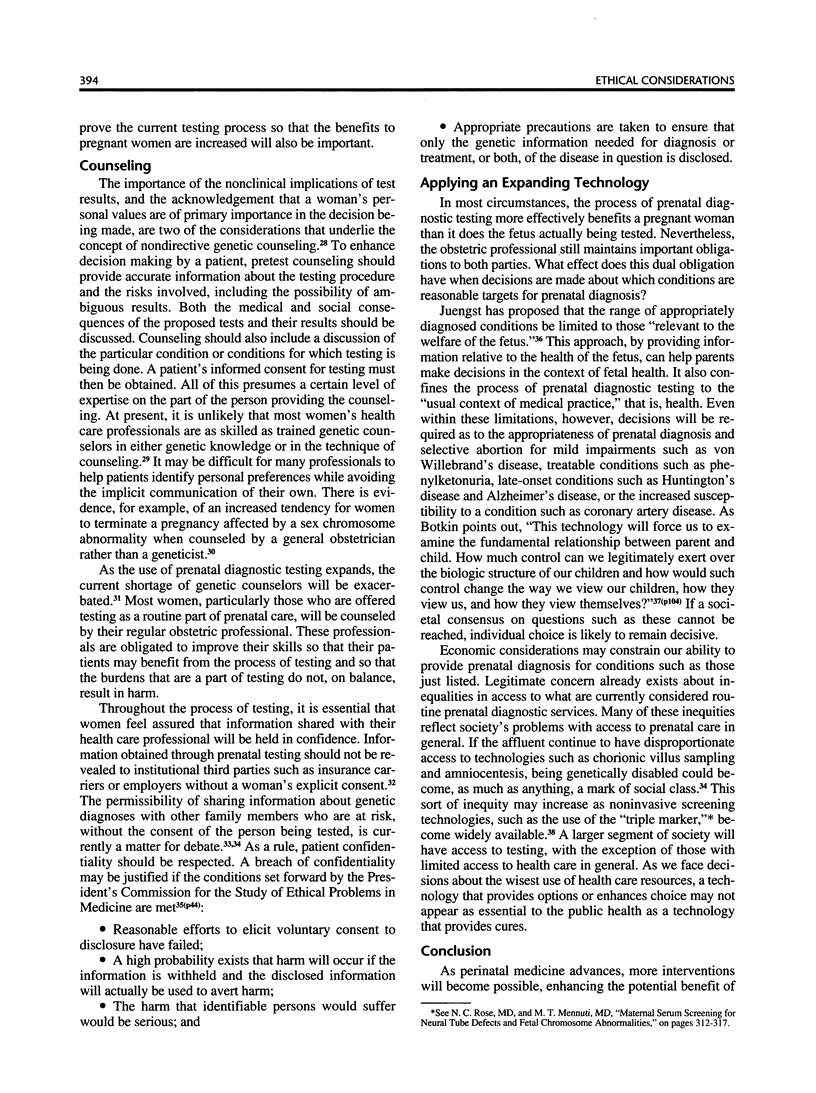
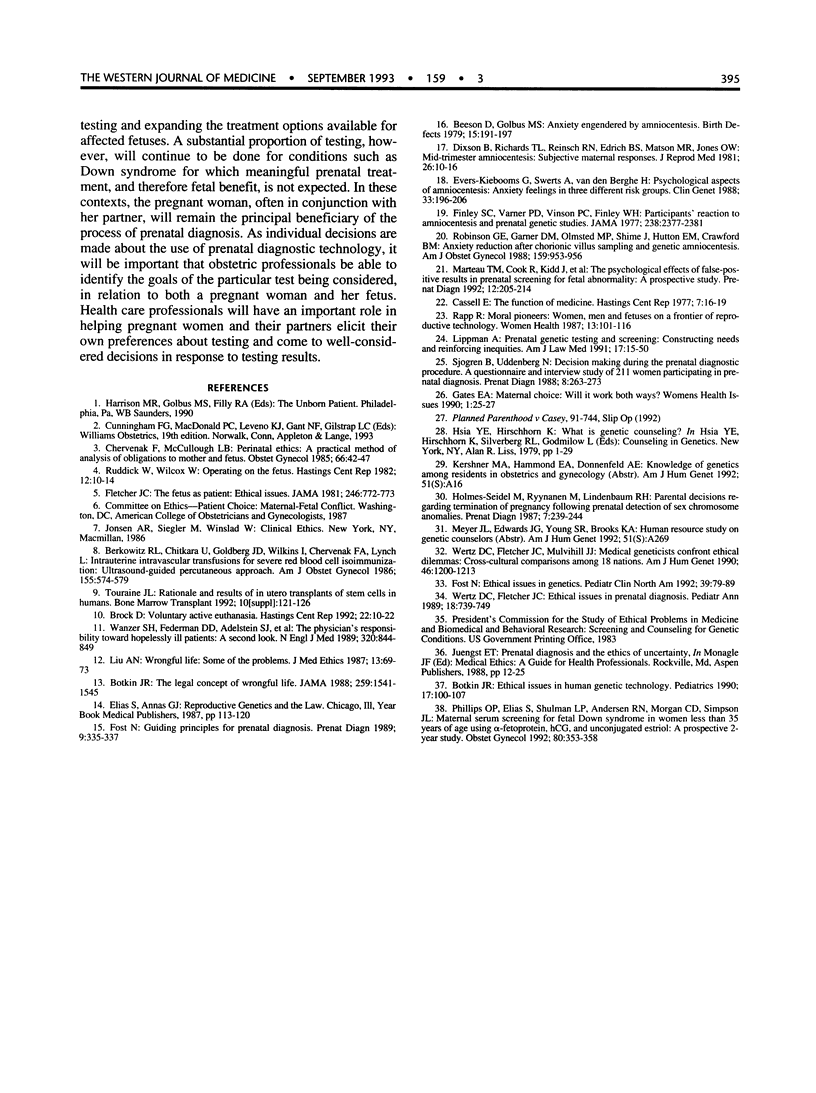
Images in this article
Selected References
These references are in PubMed. This may not be the complete list of references from this article.
- Beeson D., Golbus M. S. Anxiety engendered by amniocentesis. Birth Defects Orig Artic Ser. 1979;15(5C):191–197. [PubMed] [Google Scholar]
- Berkowitz R. L., Chitkara U., Goldberg J. D., Wilkins I., Chervenak F. A., Lynch L. Intrauterine intravascular transfusions for severe red blood cell isoimmunization: ultrasound-guided percutaneous approach. Am J Obstet Gynecol. 1986 Sep;155(3):574–581. doi: 10.1016/0002-9378(86)90282-6. [DOI] [PubMed] [Google Scholar]
- Botkin J. R. Ethical issues in human genetic technology. Pediatrician. 1990;17(2):100–107. [PubMed] [Google Scholar]
- Botkin J. R. The legal concept of wrongful life. JAMA. 1988 Mar 11;259(10):1541–1545. [PubMed] [Google Scholar]
- Brock D. W. Voluntary active euthanasia. Hastings Cent Rep. 1992 Mar-Apr;22(2):10–22. [PubMed] [Google Scholar]
- Cassell E. J. The function of medicine. Hastings Cent Rep. 1977 Dec;7(6):16–19. [PubMed] [Google Scholar]
- Dixson B., Richards T. L., Reinsch S., Edrich V. B., Matson M. R., Jones O. W. Midtrimester amniocentesis. Subjective maternal responses. J Reprod Med. 1981 Jan;26(1):10–16. [PubMed] [Google Scholar]
- Evers-Kiebooms G., Swerts A., van den Berghe H. Psychological aspects of amniocentesis: anxiety feelings in three different risk groups. Clin Genet. 1988 Mar;33(3):196–206. doi: 10.1111/j.1399-0004.1988.tb03437.x. [DOI] [PubMed] [Google Scholar]
- Finley S. C., Varner P. D., Vinson P. C., Finley W. H. Participants' reaction to amniocentesis and prenatal genetic studies. JAMA. 1977 Nov 28;238(22):2377–2379. [PubMed] [Google Scholar]
- Fletcher J. C. The fetus as patient: ethical issues. JAMA. 1981 Aug 14;246(7):772–773. [PubMed] [Google Scholar]
- Fost N. Ethical issues in genetics. Pediatr Clin North Am. 1992 Feb;39(1):79–89. doi: 10.1016/s0031-3955(16)38264-5. [DOI] [PubMed] [Google Scholar]
- Fost N. Guiding principles for prenatal diagnosis. Prenat Diagn. 1989 May;9(5):335–337. doi: 10.1002/pd.1970090506. [DOI] [PubMed] [Google Scholar]
- Gates E. A. Maternal choice: will it work both ways? Womens Health Issues. 1990 Fall;1(1):25–27. doi: 10.1016/s1049-3867(05)80010-6. [DOI] [PubMed] [Google Scholar]
- Haning R. V., Jr, Steinetz B., Weiss G. Elevated serum relaxin levels in multiple pregnancy after menotropin treatment. Obstet Gynecol. 1985 Jul;66(1):42–45. [PubMed] [Google Scholar]
- Holmes-Siedle M., Ryynanen M., Lindenbaum R. H. Parental decisions regarding termination of pregnancy following prenatal detection of sex chromosome abnormality. Prenat Diagn. 1987 May;7(4):239–244. doi: 10.1002/pd.1970070403. [DOI] [PubMed] [Google Scholar]
- Lippman A. Prenatal genetic testing and screening: constructing needs and reinforcing inequities. Am J Law Med. 1991;17(1-2):15–50. [PubMed] [Google Scholar]
- Liu A. N. Wrongful life: some of the problems. J Med Ethics. 1987 Jun;13(2):69–73. doi: 10.1136/jme.13.2.69. [DOI] [PMC free article] [PubMed] [Google Scholar]
- Marteau T. M., Cook R., Kidd J., Michie S., Johnston M., Slack J., Shaw R. W. The psychological effects of false-positive results in prenatal screening for fetal abnormality: a prospective study. Prenat Diagn. 1992 Mar;12(3):205–214. doi: 10.1002/pd.1970120309. [DOI] [PubMed] [Google Scholar]
- Phillips O. P., Elias S., Shulman L. P., Andersen R. N., Morgan C. D., Simpson J. L. Maternal serum screening for fetal Down syndrome in women less than 35 years of age using alpha-fetoprotein, hCG, and unconjugated estriol: a prospective 2-year study. Obstet Gynecol. 1992 Sep;80(3 Pt 1):353–358. [PubMed] [Google Scholar]
- Rapp R. Moral pioneers: women, men and fetuses on a frontier of reproductive technology. Women Health. 1987;13(1-2):101–116. [PubMed] [Google Scholar]
- Robinson G. E., Garner D. M., Olmsted M. P., Shime J., Hutton E. M., Crawford B. M. Anxiety reduction after chorionic villus sampling and genetic amniocentesis. Am J Obstet Gynecol. 1988 Oct;159(4):953–956. doi: 10.1016/s0002-9378(88)80180-7. [DOI] [PubMed] [Google Scholar]
- Ruddick W., Wilcox W. Operating on the fetus. Hastings Cent Rep. 1982 Oct;12(5):10–14. [PubMed] [Google Scholar]
- Sjögren B., Uddenberg N. Decision making during the prenatal diagnostic procedure. A questionnaire and interview study of 211 women participating in prenatal diagnosis. Prenat Diagn. 1988 May;8(4):263–273. doi: 10.1002/pd.1970080404. [DOI] [PubMed] [Google Scholar]
- Touraine J. L. Rationale and results of in utero transplants of stem cells in humans. Bone Marrow Transplant. 1992;10 (Suppl 1):121–126. [PubMed] [Google Scholar]
- Wanzer S. H., Federman D. D., Adelstein S. J., Cassel C. K., Cassem E. H., Cranford R. E., Hook E. W., Lo B., Moertel C. G., Safar P. The physician's responsibility toward hopelessly ill patients. A second look. N Engl J Med. 1989 Mar 30;320(13):844–849. doi: 10.1056/NEJM198903303201306. [DOI] [PubMed] [Google Scholar]
- Wertz D. C., Fletcher J. C. Ethical issues in prenatal diagnosis. Pediatr Ann. 1989 Nov;18(11):739–749. doi: 10.3928/0090-4481-19891101-09. [DOI] [PubMed] [Google Scholar]
- Wertz D. C., Fletcher J. C., Mulvihill J. J. Medical geneticists confront ethical dilemmas: cross-cultural comparisons among 18 nations. Am J Hum Genet. 1990 Jun;46(6):1200–1213. [PMC free article] [PubMed] [Google Scholar]



